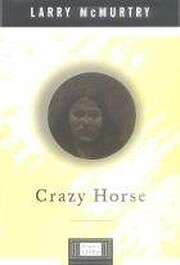

Click on a thumbnail to go to Google Books.
|
Loading... Crazy Horse (Penguin Lives) (original 1999; edition 1999)by Larry McMurtry (Author)
Work InformationCrazy Horse by Larry McMurtry (1999)
 None No current Talk conversations about this book.   ) )Legends cloud the life of Crazy Horse, a seminal figure in American history but an enigma even to his own people in his own day. This superb biography looks back across more than 120 years at the life and death of this great Sioux warrior who became a reluctant leader at the Battle of Little Bighorn. With his uncanny gift for understanding the human psyche, Larry McMurtry animates the character of this remarkable figure, whose betrayal by white representatives of the U.S. government was a tragic turning point in the history of the West. A mythic figure puzzled over by generations of historians, Crazy Horse emerges from McMurtry’s sensitive portrait as the poignant hero of a long-since-vanished epoch. A short form biography of the Sioux legend, whose life is, naturally, almost completely undocumented other than for the episodes in which he fought (or is thought to have fought) against the whites. As McMurtry points out, that fact hasn't prevented a good many historians from writing at length about Crazy Horse, primarily basing their texts on interviews with very old people who knew him or were present at his untimely and unconscionable death. McMurtry succinctly places Crazy Horse in the context of his life span, and leaves us with a portrait of an almost hermit-like man who nevertheless felt a great responsibility for his people, which was the motivation at last for him "coming in", surrendering to the Agency system in the belief that this was what was best for the people under his protection. Read and reviewed in 2015 An interesting concise recounting of the life of Crazy Horse, the last of the resistors among the Sioux people. The book suffers from some problems of style, as has been mentioned by other reviewers, McMurtry comes off as rather cranky and spends much time criticizing previous biographers attempts to cover Crazy Horse's life. The simple fact of the matter is that very little is known about Crazy Horse. His own people had very few recollections of him, and very little can be verified as to his whereabouts, let alone what he said. It seems fitting that no one knows where exactly Crazy Horse was buried. In many ways he was the last of the rogues, a Rorschacian figure of no compromise who held true to his principles to the very end. He was a tragic figure, but all in all a beautiful warrior who deserves to be remembered and mythologized. Often people with such black and white views can only truly thrive in myth, and if nothing else, this book shows that such a myth does deserve to thrive. Because this is such a slight volume in size, a reader might think this would be a good introductory biography of Crazy Horse. While I thought it was an excellent book, it's really not for the uninitiated. Anyone who doesn't have at least a bare-bones knowledge of the outlines of Crazy Horse's life and the Plains Indians wars that brought him to public attention might find himself at a loss. (A good book to provide such context is The Killing of Crazy Horse by Thomas Powers.) In what really is not much more than an extended essay, McMurtry offers these insights: 1) The encounter between whites and Indians was a true clash of cultures. While it's clearly apparent the whites misunderstood the Indians, the Indians also misunderstood the whites. For one thing, Indians had no history of practicing genocide. When the US cavalry wiped out entire Indian villages, the Indians traumatized by the action. When Crazy Horse finally surrendered himself to the army, he had no idea that the whites were so dishonorable they would actually kill him. Crazy Horse was in fact perhaps more naive than many other chiefs because he purposely kept his distance from whites most of his life--other Indians who had had more experience in treaty negotiations, etc., knew how untrustworthy their counterparts could be. 2) While Crazy Horse certainly possessed many noble qualities, the reason he has become such a sainted figure in native memory (even called an "Indian Christ") is perhaps due to the fact that he was martyred right at a time when, meeting their defeat, the native population needed a hero to extol. If Crazy Horse had lived to a ripe old age, taking part in Wild West Shows or settling into reservation life, whatever his admirable exploits in earlier life, he would probably not be held in similar regard. For those who have an interest in this period of American history, this is a very thoughtful book. no reviews | add a review
Belongs to Publisher Series
Biography & Autobiography.
History.
Multi-Cultural.
Nonfiction.
HTML: Legends cloud the life of Crazy Horse, a seminal figure in American history but an enigma even to his own people in his own day. This superb biography looks back across more than 120 years at the life and death of this great Sioux warrior who became a reluctant leader at the Battle of Little Bighorn. With his uncanny gift for understanding the human psyche, Larry McMurtry animates the character of this remarkable figure, whose betrayal by white representatives of the U.S. government was a tragic turning point in the history of the West. A mythic figure puzzled over by generations of historians, Crazy Horse emerges from McMurtry's sensitive portrait as the poignant hero of a long-since-vanished epoch. .No library descriptions found. |
Current DiscussionsNonePopular covers
 Google Books — Loading... Google Books — Loading...GenresMelvil Decimal System (DDC)978.049752History & geography History of North America Western United StatesLC ClassificationRatingAverage: (3.68) (3.68)
Is this you?Become a LibraryThing Author. |
||||||||||||||||||||||||||||||||||||||||||||||||||||||||||||||||||||||||||||||||||||||||||||||||||||||||||||||||||||||||||||||||||||||